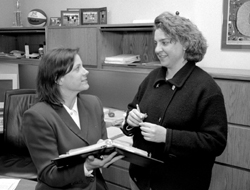By Ken Arbogast-Wilson
M-CARE

Julie Kelley and Karen Lang have a lot in common. They both work in the M-CARE Finance Department, they both are Certified Public Accountants and they both love their job.
As a matter of fact, they share the same job. For the past year, Kelley and Lang have been splitting the responsibilities of M-CARE’s assistant controller, a supervisory position in charge of financial statements, budgeting and budget projections.
This arrangement—the first of its kind at M-CARE— has had its rewards and challenges. The strong commitment to planning, communication and flexibility on the part of the job-share team, their manager and the M-CARE Human Resources Department has allowed it to flourish.
“When I had my first child, we started talking about job sharing,” Lang says. “When Julie had her first child in June 1997, we decided it was time to try it out.” Both women did a lot of research about job sharing and enlisted the help of a mutual friend with some marketing experience to put together a five-page resume. They were hired by the Business School’s Executive Education Center.
“Even though Karen was already working for U-M and we had more than 90 percent of the skills they required, the job was a lower-level position than either of us would have gotten individually,” Kelley says. “I think it was a trust issue. They didn’t know what to expect.” “When we came to M-CARE after a year and a half of working together at the Business School,” Lang says, “we had a proven track record. The hiring process was easier because we had a better idea of what to expect and what we could offer. We have also learned a lot of techniques to help us communicate.”
Lang works Monday, half of Tuesday and Thursday, while Kelley works the other half of Tuesday, Wednesday and Friday. “We have some overlap time on Tuesdays for joint meetings or planning,” Kelley explains. “The rest of the week, we talk on the phone.”
On their “off-days,” Lang and Kelley say they spend about an hour on average handling business issues via the phone. “We also keep a lot of notes in our planner,” Lang says. Since it is shared by both, neither is allowed to take the planner away from the office. The partners also share a desk, computer and a set of business cards.
Kelley and Lang compensate for different skill-sets with lots of communication and a willingness to be flexible. “My specialty,” Kelley says, “is budgeting and financial projection while Karen handles financial reporting. This has been the most challenging issue for us, especially when there is a hard deadline involved,” she continues, “but we are working at cross-training so we can become more interchangeable. Until we are fully trained, we just have to be flexible, and coordinate our schedule with our manager.”
Kelley and Lang’s supervisor, Tom Rennell, is an advocate of job sharing. “Their different skills and schedules can present challenges sometimes,” Rennell says, “but it’s worth the extra effort for what the company gets in return.” Kelley and Lang provide the expertise of two highly-qualified people, even though they only work part-time. When one of them goes on vacation, the other usually covers for her.
“Between the two of them, they manage eight employees and keep things running smoothly,” Rennell says. “We received very positive comments from this year’s auditors regarding our people and processes. They [Kelley and Lang] were solely responsible for that. I’m really glad we did all the work at the beginning to get them hired, because we’re benefitting from the results now.”
Joe Katulic, M-CARE’s human resources director, emphasizes M-CARE’s openness to considering alternative work arrangements. “We receive a lot of questions about options like flexible schedules, telecommuting and job sharing,” he said, “but when it comes to actual requests to implement them, we only get a few. I think that’s because there are so many complex factors involved in these alternatives. We always try to come up with the best solution for everyone involved. Managers are usually the first ones to be approached by employees or candidates for employment. We try to support them and advise them of potential issues up front so they can make the best decisions,” Katulic says.
“We handle each case on an individual basis. The arrangement has got to make sense for the employee and his or her department, and the organization.”
This article initially appeared in the May 2000 issue of the Inside M-CARE Newsletter.

